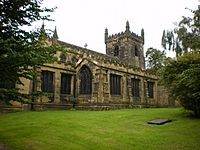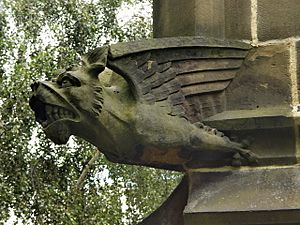St Peter's Church, Birstall facts for kids
Quick facts for kids St Peter's Church |
|
|---|---|
| Church of Saint Peter | |
 |
|
| Location | Birstall, West Yorkshire |
| Country | England |
| Denomination | Church of England |
| Churchmanship | Open Evangelical |
| History | |
| Status | Parish church |
| Architecture | |
| Heritage designation | Grade II* listed building |
| Specifications | |
| Materials | Sandstone, slate roof. |
| Administration | |
| Parish | Birstall |
| Archdeaconry | Leeds |
| Diocese | Leeds |
| Province | York |
St Peter's Church is a special old building in Birstall, West Yorkshire, England. It is an active Anglican church, which means it's part of the Church of England. It serves the local community as a parish church within the Diocese of Leeds.
Contents
A Look Back at St Peter's Church
St Peter's Church is very old, dating back to Norman times. It was first built in the year 1100 by a person named Radulphus de Paganell. The church's tower is the oldest part still standing today. Its first two sections were built in the 12th century.
Later, in the 15th century, the tower was made taller. The church also had a big makeover between 1863 and 1870. This work was done by an architect from Leeds named W. H. Crossland. On March 29, 1963, the church was given a special status. It became a Grade II* listed building, meaning it's a very important historic place. More recently, between 1997 and 2000, a screen was added inside. This created separate meeting rooms within the church.
Exploring the Church's Design
The church has interesting features both inside and out. Its design shows how it has changed over many centuries.
Outside the Church
The church tower has three main parts. The bottom two parts are from the original Norman period. They have strong diagonal supports called buttresses. In the 15th century, tall corner decorations called pinnacles were added. The middle part of the tower has narrow windows. You can also see a round clock on the west side. On the south side, there is a sundial from 1660 that tells time using the sun.
The chancel, which is the area around the altar, also has diagonal buttresses. On its north side, there is a small chapel. On the south side, you'll find a room for the clergy (called a vestry) and a place for the organ.
Inside the Church
The main part of the church, called the nave, has four sections. These sections are separated by arches supported by eight-sided pillars. The tower has a rounded arch from around 1100, which is very old. The outer aisles, which are the side sections, have seven-bay arches with special quatrefoil (four-leaf shape) pillars. The chancel has three sections.
The walls in the nave and inner aisles are plastered. However, the outer aisles and chancel have exposed stone walls, showing their original look. The floor in the south aisle is made of flat stones. The chancel has a tiled floor, and the aisle chapel has a beautiful mosaic floor.
Special Features and Art
St Peter's Church has many interesting items inside. These include old furniture and beautiful artwork.
A painting of Christ in Glory is on the east wall. This artwork was created in the early 20th century by Edward Reginald Frampton. The church also has an eight-sided font, which is a basin used for baptisms. This font has carved panels and a stem, and it dates back to the 15th century. Interestingly, it was put away in 1771 but brought back into use in 1841.
The pulpit, where sermons are given, is made of stone. It has a decorative metal railing. The wooden seats, called pews, are from around 1870. They have round designs at the top. Behind the altar, there is a decorated screen called a reredos. This reredos shows a picture of the Last Supper.
Important People Buried Here
The churchyard of St Peter's has two tombs that are also listed as Grade II historical sites. These tombs belong to important people from history.
One tomb belongs to John Nelson. He was a close friend of John Wesley, who started Methodism. John Nelson was very important in bringing Methodism to West Yorkshire. Another tomb is for Ellen Nussey, who is buried with her father, John. Ellen Nussey was a lifelong friend and wrote many letters to the famous author Charlotte Brontë.
Images for kids
 | William L. Dawson |
 | W. E. B. Du Bois |
 | Harry Belafonte |




